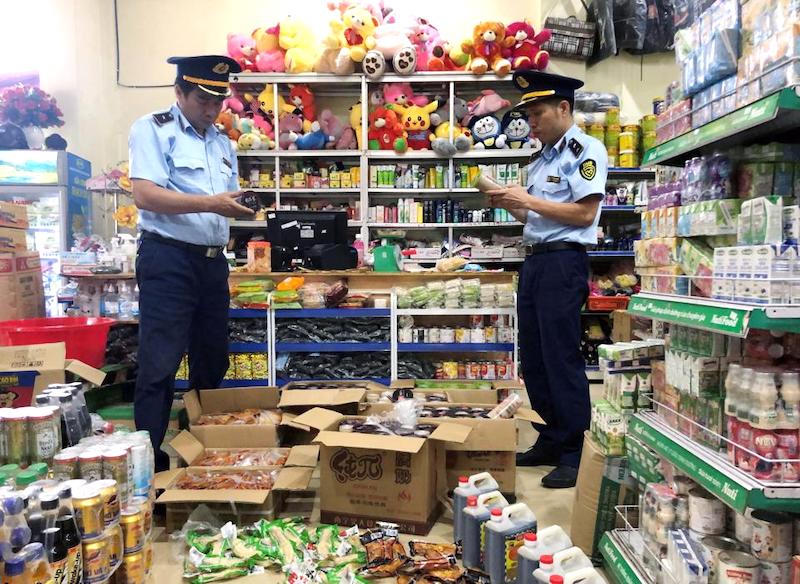Inter-agency coordination key to curbing e-commerce abuse
The explosion of e-commerce has brought with it counterfeit goods and intellectual property infringements, as well as the need to protect consumer rights.
Tran Huu Linh, Director General of the Market Surveillance Agency under the Ministry of Industry and Trade, gave an update to Cong Thuong newspaper on the fight against counterfeit goods, products infringing intellectual property rights, products without clear origin, and the protection of consumer rights amid the rapid growth of e-commerce.
| Counterfeit products are seized by law enforcement authorities. Photo: Hoai Nam/ The Hanoi Times |
What is your view on the development potential of the e-commerce market in Vietnam?
E-commerce in Vietnam has seen a strong development in the last few years, becoming a modern distribution channel and one of the most important pillars of the digital economy.
Particularly in the context of the Covid-19 pandemic, e-commerce proved its superiority in changing consumer shopping habits and behavior and became an important tool that helped many businesses and individuals overcome difficulties and even experience stronger growth during and after the pandemic.
In fact, the growth momentum of the e-commerce industry had already started before the pandemic, with an average growth rate of 25-28% per year. It slowed slightly in 2020-2021 (16-18% per year), but had an "explosive" expansion last year.
According to the Vietnam E-commerce White Book 2023, retail e-commerce sales in Vietnam increased by 25% compared to 2022 to reach US$20.5 billion, accounting for 8% of the country's total retail sales of goods and consumer services.
The number of online shoppers in Vietnam in 2023 is estimated to be nearly 61 million people, with a per capita spending of $336 per year on shopping. In addition, the infrastructure for e-commerce, such as logistics, last-mile delivery, cashless payment solutions, telecommunications, internet, and new e-commerce technologies and solutions, has been rolled out in Vietnam.
On the other hand, active foreign investment in the e-commerce sector and increased consumer spending after the pandemic have helped Vietnam's e-commerce to achieve good growth rates. According to a report by eMarketer, Vietnam is among the top five countries in the world with the highest e-commerce growth rates.
The target set for e-commerce's share of total retail sales by 2025 is 10%, according to the Prime Minister's Decision No. 411 on the approval of the national strategy for the development of the digital economy and digital society by 2025, with an orientation towards 2030. This figure is still quite conservative.
According to research by Statista, the global average share of e-commerce in total retail sales is 19.4%. Thus, the e-commerce market of Vietnam still has much room for development.
In 2023, the ministry actively and resolutely cracked down on counterfeit and fake goods and enforced the protection of consumer rights in the online environment. Can you tell us more about this work?
| Tran Huu Linh, Director General of the Market Surveillance Agency. Photo: moit.gov.vn |
The rapid growth of e-commerce has created a fertile ground for misuse. Dishonest individuals take advantage of online platforms to trade and sell counterfeit goods, prohibited items and products of unknown origin. They seize on the convenience of e-commerce to commit fraud, misappropriate assets and distribute prohibited goods, including those that undermine national sovereignty and security.
The tricks are becoming more sophisticated and harder to predict, both in terms of scale and scope. We have advised the government on many specific measures to minimize e-commerce fraud, with the aim of developing a healthy e-commerce environment and protecting consumers.
So the Ministry of Trade and Industry has submitted to the Government the promulgation of many important policies and regulations related to e-commerce, such as Decree No. 85, which amends and supplements a number of articles of Government Decree No. 52 on e-commerce, Decree No. 17 and Decree No. 98 on regulations for handling administrative violations in e-commerce. The documents have helped to create a healthy, transparent business environment, increase the responsibility of parties, build consumer confidence and promote the development of sustainable e-commerce.
By the end of 2021, the ministry had inspected nearly 3,000 cases (including violations of e-commerce and acts of profiteering through e-commerce, trade in smuggled goods, goods of unknown origin, goods infringing intellectual property rights, counterfeit goods) and imposed fines of over VND20 billion (US$781,562).
In 2023, the Ministry inspected 834 cases, processed 764 cases, fined VND12 billion ($469,937) and confiscated goods worth nearly VND6 billion ($234,468).
The Ministry also issued 14 notices to owners of e-commerce platforms, websites and applications to remove products that violate the law. As a result, 23,359 products were removed and 6,254 offending stores were blocked.
The products that came with maps that showed incorrect national borders were also taken off the e-commerce platforms.
What solutions does the ministry have in place for the control and prevention of this problem?
First, we are submitting to the Government and the Ministry leadership the amendments to Decree 17 and Decree 85 to ensure a transparent business market and create a favorable mechanism for complaint resolution, verification and authentication to prevent counterfeit products and goods infringing intellectual property rights.
Specifically, we will continue to submit to the government amendments to regulations to tightly control e-commerce activities and protect consumer rights for sustainable development.
Some of the issues on which we are considering proposing amendments include the addition of new concepts in accordance with the provisions of the 2023 Law on Electronic Transactions and the 2023 Law on the Protection of Consumer Rights; the addition of provisions on the authentication of individual seller accounts; and the provision of information on websites and applications of e-commerce services.
We are also working on policies on the management of social media platforms providing e-commerce services, regulations on managing foreign-invested economic organizations providing e-commerce services in Vietnam, and state regulatory responsibilities for e-commerce.
Second, we will strengthen coordination in cross-checking and exchanging information between the Ministry of Industry and Trade and the Ministries of Public Security and Finance on the misuse of e-commerce websites and applications. This includes keyword searches for prohibited products, sensitive products related to the nine-dash line (unjustifiably drawn by China to illegally claim sovereignty over Vietnamese waters), three-stripe flags [was banned by the Vietnamese Government after the US-backed Republic of Việt Nam regime was defeated in 1975 and the country was reunited], prohibited books/publications, electronic publications, films. We will also draw up a schedule for inspection and handling in accordance with the regulations.
Thirdly, we are intensifying training and capacity building for market administration, police and inspectorate officials on the inspection, supervision and handling of e-commerce violations.
E-commerce platforms must strengthen consumer protection, improve seller monitoring and product quality control, and provide public reviews of suppliers and products so consumers can make informed choices and purchases.
Thirdly, we will propose solutions and build centralized data systems shared among ministries and sectors for early detection, combating, and preventing counterfeit and smuggled goods and tax evasion, as directed by the Prime Minister in Directive No. 18/CT-TTg.
In addition, it is necessary to build a comprehensive cybersecurity management system, a monitoring and warning system for digital transformation risks that is unified from the central to the local market management level, so that incidents and breaches can be dealt with promptly.
Finally, counterfeit goods, products of unknown origin and goods that infringe intellectual property rights are not only sold online, but also displayed in shops, markets and shopping malls. E-commerce is just a new business model alongside traditional methods, and the ultimate issue is to control the origin of goods, whether they are produced in Vietnam or imported through official or smuggled channels.
Thank you for your time!














